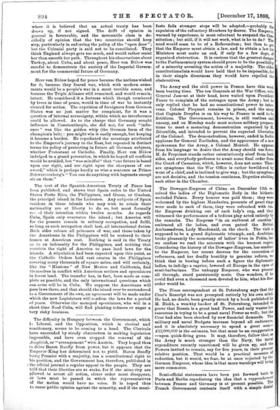Herr von Billow hoped for peace because the nations wished
for it, because they feared war, which with modern arma- ments would be a people's war in a most terrible sense, and because the Triple Alliance still remained, and would remain, intact. He considered it a fortress which though cumbered by trees in time of peace, would in time of war be instantly cleared for action. The expulsion of foreigners from German States was no just matter for complaint, for it was a question of internal sovereignty, within which no interference could be allowed. As to the charge that Germany sought influence in Constantinople, she did not, for such "influ- ence " was like the golden whip (the German form of the champion's belt) : you might win it easily enough, but keeping it became a burden. He repudiated the meanings attributed to the Emperor's journey to the East, but repeated in distinct terms his policy of protecting in future all German subjects, whether Protestant or Catholic. Finally, Herr von Billow indulged in a grand peroration, in which he hoped all conflicts would be avoided, but "was mindful" that "our future is based upon our right, and our right upon the sharpness of our sword," which is perhaps hardly as wise a sentence as Prince Schwartzenberg's " You can do anything with bayonets except sit on them."










































 Previous page
Previous page